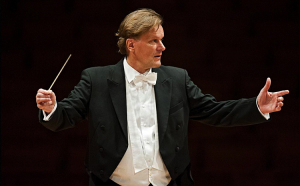by Jarrett Hoffman

“Medicine is based on natural scientific laws and formulas, and music is based on mathematical composition. But then of course you add subjectivity and emotion. The musical interpreter will load a composition with his personality, and as a patient, you wish for a doctor that has empathy for you and makes you truly feel good caring for you. And both fields include quite extreme emotions — in medicine dealing with disease or even death, and in good art covering lots of different emotional states.”
Beginning on Wednesday, December 6 at 7:30 pm at St. Jerome Church in Collinwood, principal guest conductor Stefan Willich will lead CityMusic Cleveland in five free concerts of music by Mozart, Wagner, and Schubert, featuring concertmaster Miho Hashizume, principal violist Jonathan Bagg, and soprano Chabrelle Williams. See our Concert Listings for additional times and locations.
For five of the past six seasons, Willich has come to town to conduct CityMusic’s December concerts. “I always look forward to these weeks before Christmas,” Willich said. “What CityMusic does in terms of their programming, the musicians, and the audiences is very special and rewarding for me.”
Beginning the program with Mozart’s Sinfonia Concertante in E-flat, Willich will turn to Wagner’s Wesendonck Lieder in an arrangement for soprano and orchestra. “The Lieder show such intimate love and emotion,” he said. “We conclude with Schubert’s Symphony No. 3, which he wrote when he was 18 years old. It’s jubilant, joyful, and the most imaginative music.”
The conductor’s affinity for German and Austrian composers comes through in his CityMusic programs. “Since I was born and raised in Germany, I have a very genuine relationship with that music. It just comes very intuitively to me. I think it’s a good fit — the orchestra loves to play it, the audience loves to hear it, and they know that it’s my cup of tea. But by the same token, of course, there’s fantastic Russian, French, American, English, Italian music, you name it.”
Careers in music and medicine have played out in fascinating ways for Willich. He studied violin, chamber music, and conducting in Stuttgart and Berlin, but changed course to cardiology and research, working at Harvard Medical School and now at the Charité University Medical Center in Berlin. In addition to his positions with the World Doctors Orchestra and CityMusic, the musical side of his career has included serving as president of the Hochschule für Musik Hanns Eisler from 2012 to 2014.
At the junction of choosing a specialty in medicine, why did Willich opt for cardiology? “I think there’s something essential in it,” he said. “The heart is the muscle that never stops beating, so it gives you rhythm throughout your life, and that was quite appealing to me. It’s a very functional system that supplies oxygen and brings life to all areas of the body.”
In addition to cardiovascular disease, prevention, and health economics, integrative medicine has long intrigued Willich, especially the role of the arts in the field. “If you look in the new buildings of the Cleveland Clinic, for example, there’s a lot of visual art included now, and they invite music ensembles to perform there. Particularly in Cleveland, the medical world has realized that art can provide a lot of healing support for patients. This is a very exciting and fairly new association that needs to be explored in more detail.”
In 2007 Willich founded the World Doctors Orchestra, made up of physicians who are also active musicians, many with a professional background in the art. From a pool of 1,000 participants in over 50 countries, about 100 gather two to three times a year to play benefit concerts for medical aid. “For example, a year ago we had a concert in San Francisco,” the conductor said, “and for the charity a colleague of the orchestra chose a home for children that are life-threateningly sick. It offers shelter to the families, so they can spend the end of their children’s lifetimes together under medical care conditions. We found that very important, very impressive.”
The WDO’s second-ever concert took place in Severance Hall in 2009. “That was fantastic,” Willich said. “Cleveland is one of the meccas of medicine and of course also an amazing place for classical music, with the long history of The Cleveland Orchestra and other ensembles, and of the conservatory. It’s a very special city.”
Bringing music to venues in different neighborhoods of this city is one aspect of CityMusic Willich particularly admires, even if it does present acoustical challenges. “These are very experienced, highly professional, and skilled musicians, and they easily adapt,” he said. Even with personnel changes, Willich has found that the inspiring atmosphere of the group prevails. “The spirit that is set in this orchestra has been the same for a very long time. It’s an excellent group of musicians, many of them quite young professionals and very eager and easy to work with. It’s truly a pleasure to be with this orchestra.”
Published on ClevelandClassical.com November 28, 2017.
Click here for a printable copy of this article



